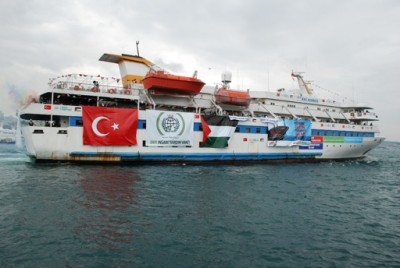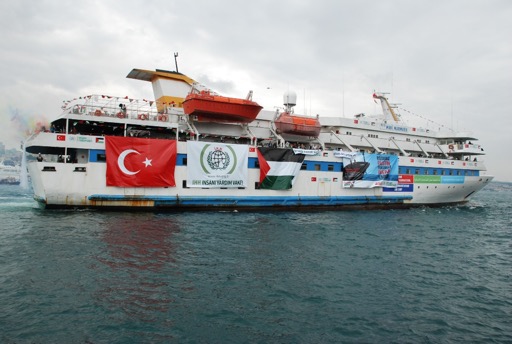 Israeli forces may have committed war crimes when they stormed an aid flotilla boat heading to Gaza, but the possible crimes aren’t grave enough to merit a prosecution at the International Criminal Court, the court’s prosecutor said Thursday.
Israeli forces may have committed war crimes when they stormed an aid flotilla boat heading to Gaza, but the possible crimes aren’t grave enough to merit a prosecution at the International Criminal Court, the court’s prosecutor said Thursday.
Eight Turks and one Turkish-American were killed and several other pro-Palestinian activists were wounded when Israeli commandos stormed the ship Mavi Marmara on May 31, 2010.
“Following a thorough legal and factual analysis of the information available, I have concluded that there is a reasonable basis to believe that war crimes under the jurisdiction of the International Criminal Court were committed on one of the vessels, the Mavi Marmara, when Israeli Defense Forces intercepted the ‘Gaza Freedom Flotilla’ on 31 May 2010,” Prosecutor Fatou Bensouda said in a statement.
But Bensouda said that any cases relating to the storming “would not be of sufficient gravity to justify further action by the ICC.”
“Without in any way minimizing the impact of the alleged crimes on the victims and their families, I have to be guided by the Rome Statute, in accordance with which, the ICC shall prioritize war crimes committed on a large scale or pursuant to a plan or policy,” Bensouda said, referring to the court’s founding document.
In a written statement, Israel’s Foreign Ministry welcomed the decision to close the preliminary probe into a case it called “legally unfounded and politically motivated.”
It added that the investigation, formally known as a preliminary examination, had been closed without the prosecutor “seeing a need to address the issue of resort to self-defense by IDF soldiers who were confronted, as mentioned in the report, by violence” from activists on the flotilla.
Bensouda opened a preliminary investigation last year after the tiny African state of Comoros — which is a member of the court — filed a complaint about the boarding of the ship which was flying under a Comoros flag.
A Turkish lawyer representing Comoros vowed not to give up the case.
“This is a moral struggle that we’re pursuing by ourselves. It’s a legal struggle, a struggle in the name of humanity. This struggle isn’t over,” attorney Ramazan Ariturk told reporters in Istanbul. “We will object to a higher court at the International Criminal Court and we believe without a doubt that we will prevail.”
In a 61-page report, prosecutors concluded that “there is a reasonable basis to believe” that Israeli forces may have committed the crimes of wilful killing, wilfully causing serious injury and committing outrages upon personal dignity.
The report said that the findings were based on “information available at this stage” and that ICC prosecutors didn’t collect the evidence.
A U.N. report in July 2011 found that the raid was justified, but that Israel used excessive force.
Israel and Turkey are not members of the court, which only has jurisdiction over its members, over cases that are referred to it by the U.N. Security Council and over events that take place on the territory of member states.
Turkish lawyers seeking an ICC case turned to Comoros because the tiny nation is a member of the court and the Mavi Marmara was registered under the country’s flag, giving the court jurisdiction.
They pointed to another ICC case, in Sudan, in which the court opened a prosecution of a rebel accused of leading an attack on African Union peacekeepers in Darfur in which a similar number of people died.
“The same International Criminal Court accepted the gravity of the Abu Garda case in the Sudan in which 11 people were allegedly killed,” Ariturk said. “In this situation, the International Criminal Court has set a double standard and the International Criminal Court has nullified itself.”
In their report, prosecutors addressed the similarities in the number of victims in the two cases, but added there was also a key difference, because the Darfur rebels deliberately attacked peacekeepers and their actions are therefore considered by international jurists to be “violent crimes of exceptionally serious gravity.”
Business Week/AP


Leave a Reply
You must be logged in to post a comment.